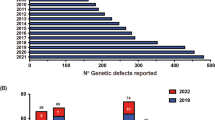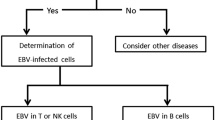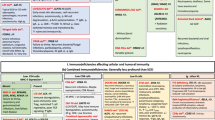Abstract
Two genes, RHD and RHCE, encode the antigens of the RH blood group system. The weak D phenotype is caused by many different RHD alleles encoding aberrant RhD proteins, resulting in distinct serologic phenotypes and anti-D immunization. We analyzed seven weak D phenotypes excluding Del, using polymerase chain reaction-restriction fragment length polymorphism (PCR-RFLP) and direct sequencing methods to detect the changes of all ten RHD exons. The results show that there are four types of weak D in Taiwanese: one case each for CGG to CAG mutation at codon 10, GTG to ATG mutation at codon 174, and GTG to GAG mutation at codon 270, and four cases for GGT to GAT mutation at codon 282. In conclusion, we present the first data of a molecular basis of weak D in Taiwanese, which suggest a clinically relevant potential for anti-D immunization and may improve transfusion strategy in weak D Taiwanese patients.



Similar content being viewed by others
References
Avent ND, Reid ME (2000) The Rh blood group system: a review. Blood 95:375–387
Huang CH (2000) Molecular insights into the Rh protein family and associated antigens. Curr Opin Hematol 4:94–103
Mouro I, Colin Y, Cherif-Zahar B, Cartron J-P, Le Van Kim C (1993) Molecular genetic basis of the human Rh blood group system. Nat Genet 5:62–65
Okuda H, Suganuma H, Kamesaki T, Kumada M, Tsudo N, Omi T, Iwamoto S, Kajii E (2000) The analysis of nucleotide substitutions, gaps, and recombination events between RHD and RHCE genes through complete sequencing. Biochem Biophys Res Commun 274:670–683
Colin Y, Cherif-Zahar B, Le Van Kim C, Raynal V, Ven Huffel V (1991) Genetic basis of the RhD-positive and RhD-negative blood group polymorphism as determined by southern analysis. Blood 78:2747–2752
Lin-Chu M, Broadberry RE, Chang FJ (1988) The distribution of blood group antigens and alloantibodies among Chinese in Taiwan. Transfusion 28:350–352
Mourant AE, Kopec A, Domainewska-Sobczak K (1976) The distribution of the human blood groups and other polymorphisms, 2nd edn. Oxford University Press, London
Wanger FF, Gassneer C, Müller TH, Schönitzer D, Schunter F, Flegel WA (1999) Molecular basis of weak D phenotypes. Blood 93:385–393
Huang CH, Chen Y, Reid ME, Okubo Y (1999) Evidence for a separate genetic origin of the partial D phenotype DBT in a Japanese family. Transfusion 39:1259–1265
Shao CP, Maas JH, Su SQ, Köhler M, Legler TJ (2002) Molecular background of Rh D-positive, D-negative, Del and weak D phenotypes in Chinese. Vox Sang 83:156–161
Wagner FF, Frohmajer A, Flegel WA (2001) RHD positive haplotypes in D negative Europeans. BMC Genet 2:10
Rouillac C, Gane P, Cargron JP, Le Pennec PY, Colin Y (1996) Molecular basis of the altered antigenic expression of RhD in weak D(Du) and RhC/e in RN phenotypes. Blood 87:4583–4861
Chang JG, Wang JC, Yang TY, Tsan KW, Shih MC, Peng CT, Tsai CH (1998) Human RhDel is cause by a deletion of 1013 bp between introns 8 and 9 including exon 9 of RHD gene. Blood 92:2602–2604
Vengelen T (ed) (1999) Technical manual: test for weak D, 13th edn. American Association of Blood Banks, Bethesda, MD, pp 659–660
Arce MA, Thompson ES, Wanger S, Coyne KE, Ferdman BA, Lublin DM (1993) Molecular cloning of RhD cDNA derived from a gene present on RhD-positive, but not RhDS-negative individuals. Blood 82:651–655
Meuro I, Colin Y, Cherif-Zahar B, Cartron JP, leVan Kim C (1993) Molecular genetic basis of the human Rhesus blood group system. Nat Genet 5:62–65
Poulter M, Kemp TJ, Carritt B (1996) DNA-based RH typing: simultaneous determination of RhC and D status using the polymerase chain reaction. Vox Sang 70:164–168
Kemp TJ, Poulter M, Carritt B (1996) A recombination hot spot in the Rh genes revealed by analysis of unrelated donors with the rare D-phenotype. Am J Hum Genet 59:1066–1073




